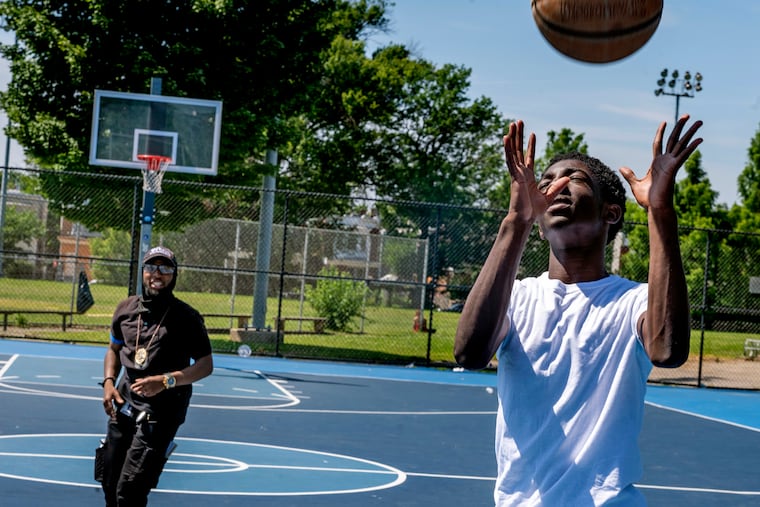Philly teens are bracing for a new curfew — and assuming some will find a way around it
Philadelphia City Council is expected to vote this week on giving kids ages 14 through 17 an earlier curfew until the end of September.

Philadelphia City Council is poised to change the curfew for teens from midnight to 10 p.m., but for kids like Musa Kane, that’ll change very little.
Even after Kane turns 16 at the end of the year, he suspects he’ll continue making it to his home in Kingsessing before sunset just to be safe. City Council has nothing on his mother, who likes him home at a reasonable hour given the violence in the city.
“I can’t do stuff as freely as I like,” said Kane. “My friends who live in safer communities can stay out till 12 and stuff, but because I live here, at like seven I have to come back home.”
A handful of teens, some as young as 13, echoed Kane’s sentiment while playing pickup basketball Monday afternoon behind Southwest Philly’s Francis Myers Recreation Center. They described a summer routine of playing hoops with neighborhood kids until 6 p.m. before heading home for dinner and a night of video games that range from 2K to Roblox and Grand Theft Auto. The older teens might throw in a trip to the Fashion District in Center City, but even that has an early end time to ensure a commute back before nightfall.
Philadelphia City Council is expected to vote this week on giving kids ages 14 through 17 an earlier curfew until the end of September. The proposal comes amid a surge in gun violence in the city; more than 1,000 people have been shot so far this year.
Kane and his friends said they’re aware of Philadelphia’s gun violence, and understand why Council would push for the change. Though they thought their older peers, who are exploring new freedoms, will find ways to stay out late regardless of what the city has to say.
“They’re partying and stuff,” said Kane. “And they probably aren’t gonna listen either because I feel like teens, we don’t listen that much. We’re just young and want to do what we want to do.”
According to police data, curfew violations had more than doubled by early June compared to the same time in 2021. About 42% of these violations have come from Southwest Philadelphia, where Kane lives.
The teens who break curfew don’t get an initial $250 fine anymore, due to changes made by City Council last year. Instead, police officers are supposed to do their best to get the teens home. Should those efforts fail, officers can bring teens to a Community Evening Resource Center in Southwest or South Philly, a police station, or a Department of Human Services center.
Another two resource centers are slated to open in the Northwest and Central sections of the city, where teens can grab a meal or take part in activities until a guardian picks them up.
Raymond Yakeda, 43, said he’s only heard of two neighborhood kids getting picked up by police for breaking curfew. He generally welcomes the revamped approach as a father of 14- and 16-year-olds.
“A lot of kids are getting killed at an early age,” said Yakeda. “It may not be meant for them but they’re dying, being shot.”
Still, at a field at Kingsessing Rec Center, Ramon Elliott, 16, cautioned against overstating the power of curfews.
“Other kids probably won’t care, they’ll probably just keep staying out,” said Elliott. “They’ll probably just take it as a joke.”
Some of the younger teens worried about the unintended consequences of the curfew. One 15-year-old, who didn’t want to be named because he didn’t have permission to be out of the house, was curious how this would affect his new summer job that had him commuting home around 10 p.m.
“People get killed in broad daylight, why would a curfew matter?” asked the teen.